Navigating Language Barriers: Tips for Effective Communication While Studying Abroad
Studying abroad is a thrilling venture filled with opportunities for personal and academic growth. However, one of the most significant challenges international students face is navigating language barriers. Effective communication is crucial for making friends, engaging in class, and immersing oneself in a new culture. Here are some valuable tips to help you overcome these challenges and enhance your study abroad experience.
1. Embrace the Local Language
One of the best ways to break down language barriers is to learn the local language. Even if you’re not fluent, making an effort to speak the language can go a long way. Start by learning basic phrases and greetings. This demonstrates your respect for the culture and encourages locals to engage with you.
2. Use Technology to Your Advantage
In today’s digital age, technology offers various tools to aid communication. Language translation apps and online dictionaries can assist in real-time conversations. Consider using these tools when you’re unsure about a word or phrase. However, remember that they may not always provide contextually accurate translations.
3. Practice Active Listening
Effective communication is not just about speaking; it also involves listening. Practice active listening by focusing entirely on the speaker, nodding, and responding appropriately. If you don’t understand something, don’t hesitate to ask for clarification. This approach will help you grasp nuances and improve your language skills.
4. Engage in Cultural Exchange
Participate in cultural exchange programs or language tandem groups where you can meet locals eager to learn your language. This reciprocal learning environment allows for mutual understanding and helps you practice speaking in a low-pressure setting.
5. Be Patient and Open-Minded
Language barriers can lead to misunderstandings and frustration, but patience is key. Maintain an open mind and a sense of humor about the situation. Miscommunication can often lead to amusing moments that can strengthen relationships rather than hinder them.
6. Join Student Organizations
Get involved in student organizations or clubs that interest you. These groups often attract diverse members, providing a natural environment to practice your language skills. Plus, they offer a wonderful way to meet new friends and broaden your cultural understanding.
7. Seek Help When Needed
If you're struggling, don’t hesitate to seek help. Many universities have support services for international students, including language workshops and tutoring. Utilizing these resources can significantly enhance your language proficiency and confidence.
8. Stay Consistent and Practice Regularly
Consistency is vital when learning a new language. Set aside time each day to practice speaking, writing, and reading in the local language. Engage with local media, such as newspapers, podcasts, or TV shows, to immerse yourself in the language and culture.
Conclusion
Navigating language barriers while studying abroad can be challenging, but with the right strategies, it becomes manageable. Embrace the opportunity to learn and grow, and remember that effective communication is a skill that improves with practice. Equip yourself with these tips, and you’ll not only enhance your academic experience but also create lasting memories and friendships.




Leave a Comment
To post comment, please